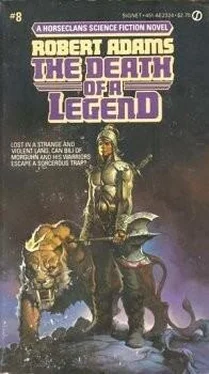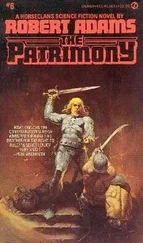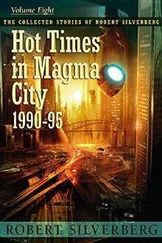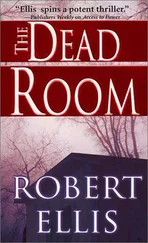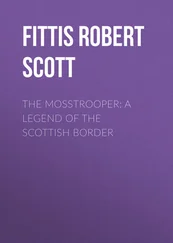Each horse of the squadron was protected with an armor that included metal plates, chainmail, scale and hardened leather. In action, many of them could be as ferocious as any war-trained destrier, but they were not allowed to be as stubborn as a destrier—any dismounted trooper or officer could safely mount a horse with no rider, as long as the man could satisfy the horse with mindspeak that he was friend rather than foe. The breed was highly intelligent, for horses and mounts rendered riderless for one reason or another could and had been seen to recognize different bugle calls, respond property and perform intricate drill-field maneuvers unguided by human hands.
Before him, the young officer could sec through the slits of his steel visor the open stretch of campsite that lay between him and his objective, the flank of the mob of mounted embattled rebels. To his mind, there were far too many still or thrashing forms of men and beasts littering that stretch of ground; the arrow rain had been costly in unarmored service personnel and draft animals. But he also noted that those before him who could walk, hobble or crawl were stirring their stumps; they could see what was coming, and none of them apparently cared to be ridden down by charging kah tahfrahk toee.
When his path seemed relatively clear, Gaib mindspoke the bugler and “Trot March” pealed out, followed by the familiar increase in the noise level from the hoof-thumping, creaking, rattling squadron.
And as never failed to happen at such a point of imminent action, Gaib’s chest felt unbearably constricted. His guts were aroil and uncomfortably full, his mouth was dry as dead leaves, and he knew for certain that his distended bladder soon would burst; so, drawing himself up even straighter in his kak, he began to sing, his voice booming in the confines of his helm.
“… then let us sing our battle song
Of saber, spear and bow.
Clan Linstahk, Clan Linstahk,
Your courage we’ll show…”
Noting the now-decreased distance, Gaib mindspoke again, and “Gallop March” blared from his bugler’s instrument, as before being taken up halfway through by the troop buglers.
Gaib mindspoke his destrier stallion, Windsender, “I know that you lack that shoe, my brother, and I am sorry to cause you pain, but this must be; we must finish this fight before I can see to you.”
“Your brother understands, my brother,” the big bay beamed back. “There is not much pain and, besides,” he added with a trace of eagerness in his beaming, “a good fight does not come every day.”
At the moment he gauged best, Gaib raised his saber high over his head, twirled it twice, then swung it down to the horizontal, pointing straight forward… and five brass bugles screamed the “Charge.”
Struck on the exposed flank by such a force, many of the rebels were impelled so far to their right that many a horse and rider plunged over the crumbly lip of the deep gully, to flounder in the shallow but cold water until another horse and rider landed atop them.
Almost immediately the charge was delivered, the rebel commander astutely commenced a fighting withdrawal of his force, and, to his credit, Gaib estimated that a bit fewer than half the original force committed actually got away—surviving the bloody, breast-to-breast battle with Thoheeks Kahr’s men, the smashing charge of Oaib’s squadron and the running fight of the pursuit undertaken by the nobles, the lancers and two troops of the kahtahfrahktoee. “And I had to miss it,” thought Bili ruefully, “every damned bit of it. By the time the High Lord and I got there, the pursuit was already trickling back into camp.”
A Freefighter with a dirty, blood-stained bandage wrapped about his head limped up to the fire and cast upon it most of a small evergreen tree, producing a momentarily brighter, hotter fire and sending a myriad of sparks dancing up into the sky.
And that fiery crackling roar brought young Thoheeks Bili back to the present, where some of the leaders of his battered and singed command chatted in low, tired tones about the fire, wounded moaned and whimpered here and there, and horses stamped and whuffied downslope in the narrow strip of yellowed grass. He suspected that he and they were deep, far too deep, in the territory of the savage, sinister Muhkohee, for the plateau they had been forced to flee had been the westernmost of the Ahrmehnee lands, and they now were far west—he was not sure just how far west—of that area.
They seemed secure for the nonce, however. The narrow vale had been scouted thoroughly while still there was light enough to do a good job of it and had proven to be almost boxed in by the high, rugged hills. Nor could the smoke and glare of their fires betray their location, not with so much smoke, so many fires spawned by the hot rocks still smoldering.
While Bili had been a-musing, his Freefighter orderly had removed the young nobleman’s cuirass, brassarts, vambraces and tasses. Now he helped him to struggle out of his smelly, sweat-soaked gambeson. Freed of that much weight and hindrance, Bili stripped off his soggy shirt and, heedless alike of the chill night air and the gathering of men and women around the large fire, he paced down to the chuckling brook and dumped several helmetsful of icy water over his head and his thick, scarred torso, rubbing all the bared skin he could reach with the hard palms of his big hands before again dousing himself with the frigid water. Then he returned to the fireside and wrapped himself in his cloak. Seating himself on a pile of horse gear, Bili addressed himself to one of the older Ahrmehnee, asking politely, “You’re a Panosyuhn, aren’t you? The most western of the Ahrmehnee tribes?”
The graying warrior nodded and replied in atrociously accented Trade Mehrikan, with long pauses here and there as he sought to mentally translate his own language into one that this young warleader could understand. “Yes, I’m Vahrtahn Panosyuhn, hereditary headman of a valley northeast of the Great Plateau.” Bili nodded brusquely. “Well then, this is your country. Where is the nearest village? How far, do you think? We need food, and the wounded fighters and horses need rest and care.”
The elderly Ahrmehnee shook his head vigorously. “No, Dook Bili, this is not my country. This all about this place Muhkohee country, whence came that horde you saved us from; we have been in their savage land for many miles, now.
“The west edge of that plateau that was has ever been the… the border between civilized Ahrmehnee and barbarian Muhkohee. If any villages or hovels lie hereabouts, they are assuredly Muhkohee nests and we’d do well to stay clear of the filthy holes.”
Aware that the Ahrmehnee were noted for quick tempers and leery of precipitating even a hint of trouble in this volatile and ill-matched force he now led, Bili was careful to cast no slightest aspersion upon this headman’s courage. “Why should we be fearful of a few barbarian villagers, Lord Vahrtahn? The wounded aside, we mount some eight score swords, so why should we not simply take what supplies we need from a village… if we find one?”
But it was one of the subcommanders of the Moon Maidens who answered him, her Trade Mehrikan no better than that of Vahrtahn Panosyuhn. “Were we so rash as to do so, and no woman would be so stupid… though it is easy to see how you childish man-warriors could be… dead would we all be before leave this terrible land we could, leader of manwarriors. Wait we must until dead are the fires and cooler the ground, for the way we came we must go; death or worse than a quick death in any other riding lies.”
Old Vahrtahn Panosyuhn nodded once, his gray beard rippling over the face of his battered cuirass. “The Maiden is right, Dook Bili. In this little valley we are as safe as we can be in this accursed land. What with all the ground-shakings and mountain tumblings and the fires, as well as the heavy slaughter we all wrought upon the savages, perhaps we will not be noticed before we can retrace our steps and be gone. At least, let us all now pray that the Radiant Lady so ordains it.”
Читать дальше
